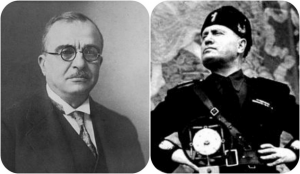At 3 a.m. on the morning of October 28th, 1940, Emanuele Grazzi, the Italian ambassador to Greece, delivered an ultimatum from Benito Mussolini to Prime Minister Ioannis Metaxas. Il Duce demanded that Metaxas allow the Italian army free passage to enter and occupy strategic sites in Greece unopposed.
Faced with this demand, Metaxas delivered an unequivocal response in French, the diplomatic language of the day, “Alors, c’est la guerre.” This brief phrase, “Then, it is war,” was quickly transmuted into the laconic “Oxi,” the Greek for no, by the citizens of Athens.
At 5:30 a.m., before the ultimatum had even expired, the Italian army poured over the Greek-Albanian border into the mountainous Pindos region of Northern Greece. There they met fierce and unexpected resistance.
Within six months, Ioannis Metaxas would be dead; his successor, Alexandros Koryzis would commit suicide; Mussolini would be humiliated; and the Germans would raise the swastika over the Acropolis.
Despite Greece’s ultimate fall to Axis powers, Metaxas’ response resulted in a fatal diversion and delay for the Axis powers in general and the German army specifically. British military historian Sir John Keegan describes the Battle of Greece as “decisive in determining the future course of the Second World War.”
For decades prior to the invasion, Greco-Italian relations had been difficult and complex: historically, both Italy and Greece could lay claim to some of the same territory. At various times the two nations tussled over the Dodecanese Islands as well as the island of Corfu in the Ionian Sea. However, in 1928, then Prime Minister Venizelos had signed a Friendship Agreement with Italy, normalizing relations.
In 1939, the Italian invasion of Albania threatened this fragile accord. Albania collapsed under the Italian onslaught: Italian troops attacked on April 7th, almost immediately gaining control of all ports. King Zog and his family fled south to Greece that same day, abandoning their people.
On April 12th, the Albanian parliament voted to unite with Italy, deposing Zog, and accepting the Italian King, Victor Emmanuel III, in his stead.
The presence of Italian troops in Albania, just over the border from Northern Greece generated enormous tension between the two countries. Both Britain and France gave Greece a guarantee of “territorial integrity.” Nonetheless, Italian forces committed numerous acts of aggression against Greece, including overflights of Greek territory and attacks against Greek naval vessels.
Metaxas began to prepare for war.
Read more HERE
Ask me anything
Explore related questions





